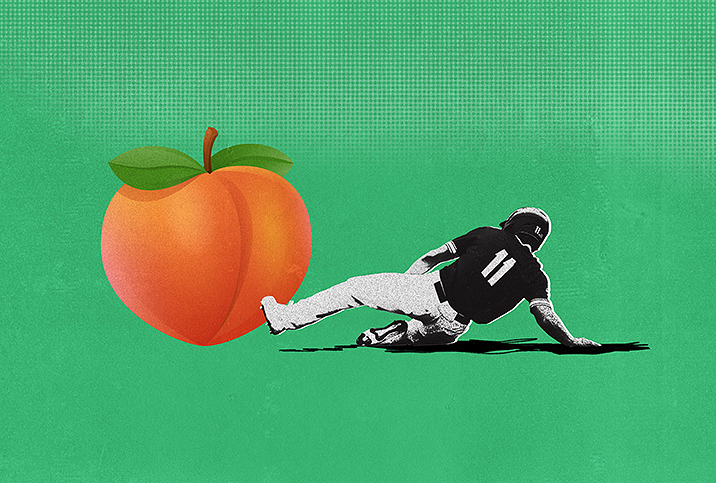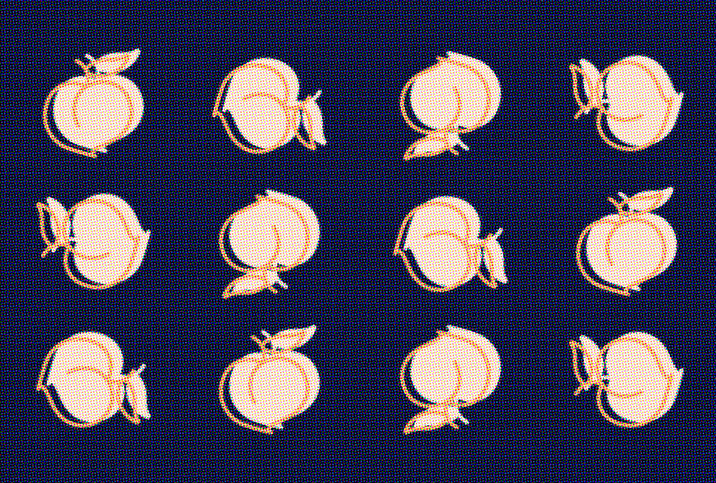There's a whole bunch of cringe-worthy euphemisms for anal sex—backdoor action, fudge packing, riding the Hershey Highway—but one in particular has caught on among sex writers; an admittedly small group of people, but one with an outsized influence on how everyone else talks and thinks about sex. "Fifth base" isn't an everyday euphemism (yet?), but cheesy BDSM erotica authors, TV writers and women's magazine editors seem hell-bent on making it happen.
Here's why they need to give it a rest.
"Fifth base" is cutesy, childish and passé: The terrain of those desperate to appear casual and worldly about sex (but who are tittering and uneasy deep down), it builds on the dated baseball analogy—kissing is first base, "hand stuff" is second, oral sex is third and intercourse is home base, that's how you "score"—which cool teens don't use anymore.
But you don't have to be concerned with the phrase's trendiness to spot other limits. The baseball analogy presents sex as a linear series of goals to achieve for the sake of peer competition, rather than a buffet of choices to explore with a partner for mutual pleasure. This is inherently pressuring, and because it prescribes a certain order for sex acts and assigns them a ranked value—intercourse trumps cunnilingus, a blow job is better than a handjob—it encourages a limiting, unerotic approach to sex. In other words, take the analogy to heart and you'll be boring in bed.
While the framework sounds gender-neutral, it doesn't take much digging to realize it prioritizes the interests of straight men. The default "player" is much more likely to orgasm at home base if he's a guy: While close to 100 percent of men routinely come from intercourse, most women don't, according to a landmark 2011 study on female sexual arousal published in Hormones and Behavior. The baseball analogy's "four sex acts, ranked" approach devalues or ignores a plethora of sex acts that might be more appealing to women, gay men and other sexual minorities such as cunnilingus, mutual masturbation and, of course, everything involving the butt.
But then, wait—isn't "fifth base" a useful extension to the metaphor? Wasn't it enlightened and inclusive to acknowledge that the player might keep running and "score" in the ass?
Not so fast. Because it extends the baseball analogy's logic, "fifth base" retains all the same failings—it's still the same heteronormative, hierarchical pursuit of male pleasure and peer status—but now anal has booted PIV sex from the top of the proverbial podium. And if women weren't particularly well-served by a sporting metaphor that made vaginal intercourse the prize, they're likely to fare even worse now that anal is the ultimate goal.
The baseball analogy presents sex as a linear series of goals to achieve for the sake of peer competition, rather than a buffet of choices to explore with a partner for mutual pleasure.
Anal sex is increasingly popular among heterosexual couples: 38.5% of men and 32.6% of women aged 15-49 have engaged in anal intercourse with an opposite-sex partner, according to 2017 data from the CDC; a significant increase compared to similar data collected in 1992 where the figures were 25.6 percent and 20.4 percent, respectively. At the same time, it shed much of its previous stigma: Anal sex was still a crime in some states until 2003, but by 2007, men's magazine GQ called it "so mainstream, some guys request it on the first date."
Some women find anal sex delightful, and if they want their dates to pound their butts right after dinner and a movie, more power to them. Research suggests they're not exactly representative, though: Women who engaged in anal intercourse "unanimously expressed a preference for vaginal sex" and "only a handful...actually enjoyed [it]," according to a 2015 study in Archives of Sexual Behavior; most women in a 2013 study in the Journal of Sex Research found anal sex "distasteful." Benefits such as pleasure or "the glory of sexual achievement" were expected for men but not women, according to a British study of 130 teens aged 16-18, and the reverse was true for risks such as reputation damage and pain.
The fact that anal is relatively unpopular among women might be due to lingering stigma about butt stuff and the persistence of gendered double standards, where guys get high-fived for trying edgier sex acts while women get called sluts. But there are physical realities to contend with, too: Unlike the vagina, the anus is not naturally lubricating, and it's an area of the body especially vulnerable to certain medical issues.
"The main risks associated with anal intercourse are tears in the anus or rectum, as well as transmission of sexually transmitted infections," said Corey R. Babb, D.O., a board-certified OB-GYN in Missouri who specializes in sexual medicine. "Although the anus is made up of squamous epithelium cells, which are the same type of cells found on other parts of our body that experience 'trauma,' such as the skin or mouth, the cell layer is not very thick, and it is easily torn."
He added that "the anus has a very rich blood supply, so any tears through the surface can easily transmit blood-borne infections such as HIV or hepatitis, [and] because stool is inherently filled with multiple types of bacteria, tears in the surface of the anus can easily become infected, which can lead to a variety of other complications."
Even with diligent preparation, being on the receiving end of anal penetration can be painful and uncomfortable—frankly, the "full" sensation is not for everyone—and if you don't have the Holy Grail of anal pleasure, the prostate gland or "P-Spot", you're missing a major upside (which isn't to say anal is universally desired among those who do, either).
Worryingly, there's evidence that women and girls are submitting to risky, painful and unwanted anal sex, despite their preferences. They do this to please their male partners or avoid violence, according to a 2009 study in Perspectives on Sexual and Reproductive Health, or because they're drunk or high, don't know they can refuse or are coaxed, coerced or outright raped, per the 2015 study. Teenage boys "were expected to persuade or coerce reluctant partners," authors of the British study said; an attitude they linked to the influence of pornography and male competition for sexual prowess ("every hole's a goal," as one boy put it).
Disturbingly, the authors found coercion and non-consensual penetration—including men deliberately "slipping" into the anus without warning—had been "normalized."
The relationships between sexual violence, social attitudes to sex and depictions of sex in the media are complicated and highly contested, but given the increasing cultural breeziness about anal intercourse and the prevalence of the coercive, competitive, "every hole's a goal" mindset identified by researchers, it's probably unhelpful to throw in another casual imperative to make anal play an objective, rather than an option.
And that's exactly what "fifth base" does: Thanks to the baseball analogy, anal sex isn't presented as just one of a smorgasbord of sex acts couples might incorporate in the bedroom if it's to their mutual liking; it's held up as the ultimate prize in a juvenile sex game rigged in men's favor.
Oh and sorry nerds, but any jock can tell you you've run out of bases, anyway.















